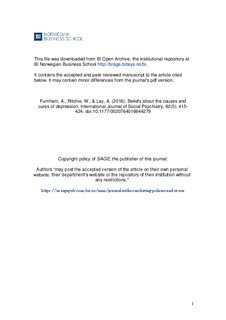Beliefs about the causes and cures of depression
Journal article, Peer reviewed
Accepted version
Permanent lenke
http://hdl.handle.net/11250/2451189Utgivelsesdato
2016Metadata
Vis full innførselSamlinger
- Publikasjoner fra CRIStin - BI [1015]
- Scientific articles [2181]
Originalversjon
International Journal of Social Psychiatry. 2016, 62 (5), 415-424. 10.1177/0020764016644279Sammendrag
Aims:
To test whether the group would recognise both vignettes with having depression and that the favoured cure would be Psychotherapy/Talking Cure.
Method:
In all, 320 adults completed a two-part questionnaire. In the first part, they were given two vignettes describing a 30-year-old female and a 45-year-old male both with depression. They were asked what they thought (if anything) was wrong with the person and how they could best be helped. In the second part, they completed two questionnaires, one which lists 47 possible causes and the other 48 possible treatments for depression.
Results:
Most participants ‘diagnosed’ depression for the two vignettes although they chose very different terms and offered a variety of ‘cures’, including medication and counselling. The questionnaires about cause and cure factored into seven interpretable factors which were logically correlated. A series of regressions showed that sex, age, media interest, political beliefs, experience with depression and other mental illnesses as well as having known of others diagnosed with depression predicted different beliefs about the causes and cures of depression.
Conclusion:
People have a detailed and multidimensional view of the causes and cures for depression which is systematically related to each other.
